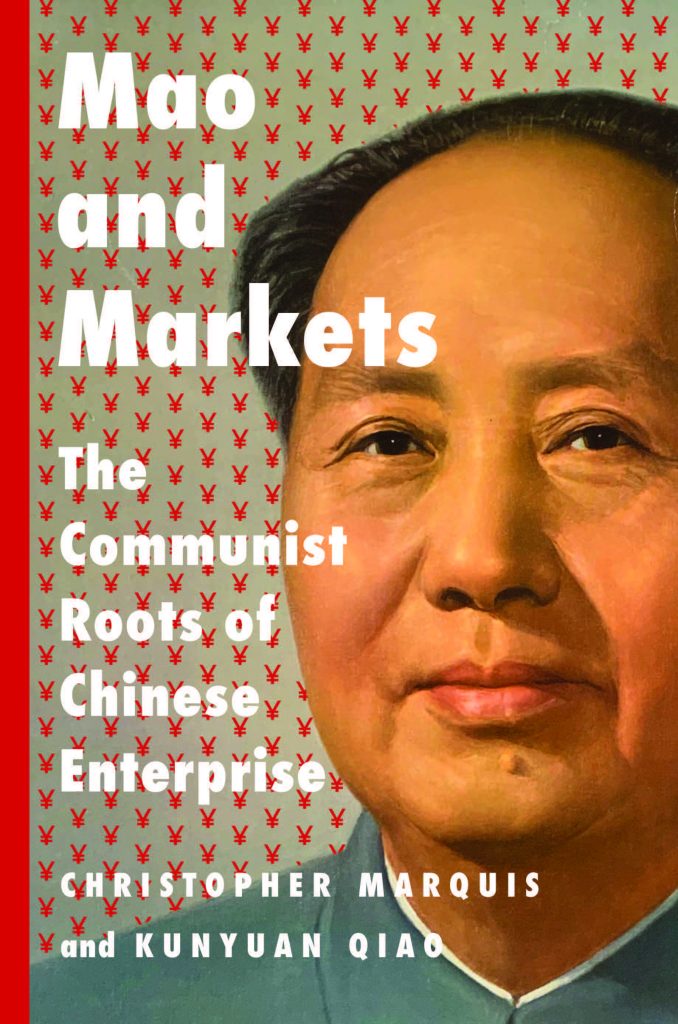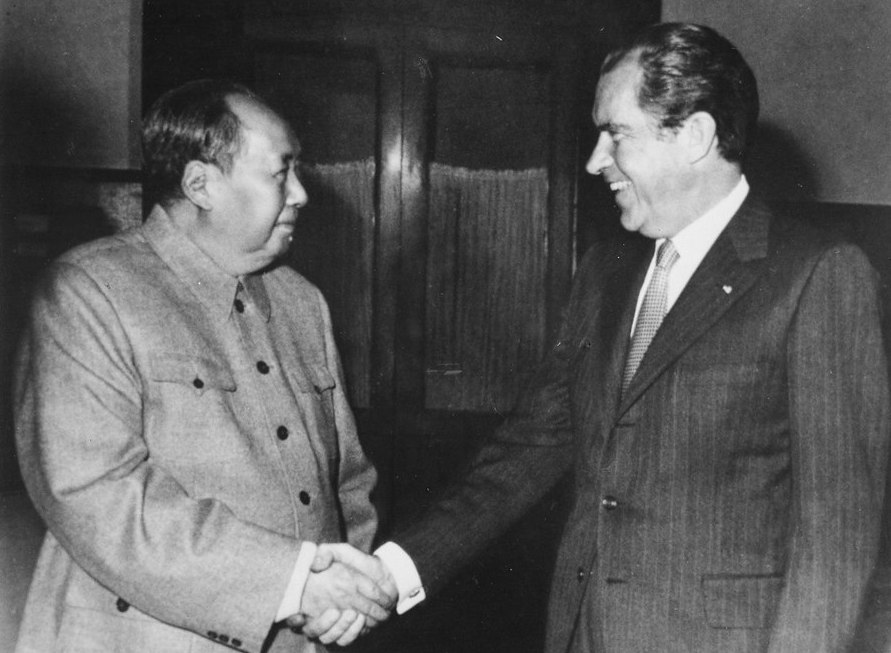Interview with Christopher Marquis – co-author of ‘Mao and Markets’

Christopher Marquis is the Sinyi Professor of Chinese Management at the Judge Business School, University of Cambridge, and a Senior Research Associate at Jesus College, Cambridge. He was previously the Samuel C. Johnson Professor in Sustainable Global Enterprise at the Johnson Graduate School of Management at Cornell University. Prior to joining Cornell, he worked for 10 years at Harvard Business School and has held visiting positions at Harvard Kennedy School, Hong Kong University of Science and Technology, Peking University, Fudan University, and Shanghai Jiaotong University. Marquis received a PhD in sociology and business administration from the University of Michigan. This interview was conducted to introduce readers to his latest book – Mao and Markets. You can find out more about this book at the end of this interview.
Q1. Could you briefly describe what people get wrong about the Chinese economy? Please describe the main argument of your latest book in a few sentences?
Christopher: Sure, and thanks for the engaging questions!
In recent years, many commentators have decried the West’s wishful thinking about China’s trajectory. Following traditional economic development theory, the widespread assumption was that as China introduced markets, the country would democratize.
This led to a biased assessment of China’s policy changes – while the West overly focused on Deng Xiaoping’s Reform and Opening policies, less examined was how the CCP has maintained Maoist principles at its core, even as it communicates ideological flexibility to the West. Mao’s successors have tightly stuck to Maoism as the bedrock of their versions of the CCP ideology, such as Deng who highlighted ‘Mao Zedong Thought’ as one of the four cardinal principles he proposed that defined China reform era.
The book focuses on why as we engage with China in the future, we need to focus less on Deng and selective focus on his reforms and better understand Mao, who invented “Chinese style” communism and devised the unique socialist institutions that differ from both the Soviet Union and the West. The unique system enables China to develop its economy while holding onto the official communist ideology and to avoid issues that the Soviet Union encountered during the economic reform.
Empirically, we examine both the business and political sectors with studies of entrepreneurs, listed companies and provincial and city politicians. We show how Mao’s various ideas, campaigns and institutions have a deep influence on those actors (and run in many ways counter to their self-interest), and so also believe they can provide insight into Xi Jinping and his governance, especially given the outcomes of the 20th Party Congress.
Q2. Can you explain some of the mechanisms that enable Mao’s ideology to exert an influence today?
Christopher: Without getting too theoretical, our book documents how and why Mao’s principles continue to be the ideological foundation for modern China and define the legitimacy of the ruling CCP. They are maintained and continue to affect individuals’ ideas through the indoctrination into the Party and more generally the educational system and other socialization processes.
Several research papers, including some of ours that we elaborate on in Mao and Markets, have shown that since the establishment of China’s communist regime in 1949, propaganda has been intense in shaping people’s outlook, especially for those who have gone through the process of joining the CCP. For example, these individuals have to attend important socialization events, study the Party Constitution, and watch related documentaries that celebrate the Party and Mao. This research has shown that after such indoctrination, individuals tend to identify closely with the CCP and given CCP membership now exceeds 95 million, including a significant portion of the elite, such processes should be focused on in much more detail.
But also, there is evidence of transmission of Maoism and in many places beyond simply CCP members, for instance, younger generations’ are expressing vocal admiration for Mao which has been socialized and passed on from their parents and earlier generation. Numerous entrepreneurs we surveyed for our book discussed how Mao set the ideas that provide the ideological grounding for China that they have learned these ideas from their parents and also discuss them frequently with their children.
Moreover, the Chinese educational system strengthens Maoism, aiming to nurture communist ideas starting in early childhood. For instance, from elementary school to college, students are required to take political courses that extol Mao and the CCP’s history, and good grades in these courses are critical for ones future.
Q3. There is a traditional view in Chinese politics that Mao relied on violence control, Deng relied on money and Xi is relying on ideology today – how would your book fit into this perspective?
Christopher: Interesting, I had actually not heard of this specific statement before and while it is generally on target, I also think Mao’s influence and control is more complex than just ruling by violence.
Certainly Mao is well known for numerous acts of mass violence from Yan’an to the Cultural Revolution. And many of his evocative quotes highlight this, such as “a revolution is not a dinner party” and “political power grows out of the barrel of a gun.” So I am not disagreeing that Mao did rule in part by violence.
But I don’t think you can’t underestimate Mao’s focus on developing and promoting an ideology to solidify his rule and establish the legitimacy of the CCP. To cite an obvious example, the pictures of thousands of Chinese waving the “Little Red Book” of Mao’s quotations. Mao was essentially deified in China during his life, a testament to the strength of his ideological hold on the Chinese population.
The depth of ideological commitment to Mao has also been reinforced over time as my answer to the above question discussed. And many of the entrepreneurs we interviewed for the book, including many non-CCP members, talk reverently about how Mao and his ideas have shaped China and their perspective.
Q4. Could you speak a little more on mass campaigns? We see that this is not without political risk in today’s China most notably with Bo Xilai and his attempt at scaling this at the provincial level. Is this still possible under Xi or can we only expect particular, state-sanctioned kinds of campaigns?
Christopher: Sure, as I think governance through through campaigns is a cornerstone of the Xi era, and is one of the many ways he is following in Mao’s footsteps.
In addition to the Cultural Revolution in the 1960s and 1970s, which is arguably Mao’s most well known campaign, he initiated many other Mao’s political campaigns such as his purging of enemies such as the “Yan’an rectification” that consolidated Mao’s rule in the 1940s and “Anti-rightist” campaign that sidelined CCP members with liberalizing ideas.
In many respects this is a path that Xi has followed, and commentators have drawn parallels with his anti-corruption campaign and also the campaign like nature of his crack-down on industries such as high tech and education. In his speech celebrating the centenary of the CCP Xi used the word “revolution” 17 times and “struggle” eight times, explicitly invoking Mao’s famous “We [the CCP] dare to overturn the old world and change into a new look.”
More essential to understand current day China is how Xi uses Mao’s campaign logic in the non-political realms, such as through the “people’s war” against COVID, itself a strategy that relies on mass mobilization. Like Mao, Xi is obsessed with industrializing campaigns that as he puts it “concentrate strength to do big things,” but seemingly don’t have an adequate focus on economic reality such as China’s campaign for independence in industries such as semiconductors which has led to a monumental waste of resources without much to show for it.
Q5. Is there anything missed by China watchers today that you think we should pay more attention to?
Christopher: It may sound somewhat self contradictory, but I think the China watching field is too China-centric. I see in the community a form of gatekeeping around proving one’s China studies bonafides, and too much discussion about how because of how complex China is, to be an effective commentator requires extensive study of Chinese language, history, culture, etc. Certainly I am not discounting the importance of these items – deep China knowledge is clearly a prerequisite to effective commentary. And this has very much shaped my perspective too, and resulted in me living and teaching in China and working quite hard to learn Chinese.
But so much focus on “knowing China,” I think leads to a too quick dismissal of what other social science disciplines can contribute to our understanding of what is happening in the country. In particular, I think there needs to be more recognition and embrace of what can be gained from behavioral disciplines like psychology and sociology that focus on how fundamental cognitive and social processes work.
This was one of the significant starting points for our book. There are well-developed literatures on how and why the effects of founding leaders last and also the importance of ideology and institutions as shaping behaviors in ways more traditional rational actor perspectives miss. Mao and Markets focuses on how a big gap in our understanding of China is around the foundational role of ideology and institutions that are the bedrock of the CCP and country. And importantly, how these ideas stem from the PRC’s founding leader Mao Zedong and that the principles and corresponding systems established early in PRC history run deep in Chinese society and manifest in business, politics and daily life.
Drawing these conclusions certainly requires understanding Chinese history, culture, politics and more. But also more generally, social science can help us see the forest and not just the trees. For example, some comparisons between Xi and Mao have been critiqued as being a bit simplistic and focusing too much on how Xi is (or is not) a second Mao. I agree with this, but a kneejerk rejection of any parallels results in us missing which of Mao’s ideas and governance levers continue to resonate and how they can be used by politicians. Drawing on the social science literatures I mentioned can help us connect the dots between the past and the present in a more effective way.
Advance Praise for Mao & Markets:
“Capitalism and communism are entwined in China. Mao and Markets illuminates the connections between the history of the Chinese Communist Party and early leaders to the current Chinese economy and society. It will give insights not only to those who do business in China, but also for those interested in the nature of Chinese nationalism.”—Rana Mitter, Professor of the History and Politics of Modern China, University of Oxford
“Contributing to the lively debate over whether today’s China is better understood as ‘capitalist’ or ‘Communist,’ Chris Marquis and Kunyuan Qiao offer an informed and engaging argument for the deep and enduring influence of Maoism on contemporary Chinese politics and economy.”—Elizabeth J. Perry, Henry Rosovsky Professor of Government, Harvard University
“A compelling and provocative book. Marquis and Qiao dispel the naïve Western view that China is likely to conform with our system. Mao’s legacy as an uncomfortable alternative deserves serious consideration.”—Stephen Roach, author of Accidental Conflict: America, China, and the Clash of False Narratives

Dylan is the founding editor of The Politburo and is an Assistant Professor at Nanyang Technological University. Views expressed are his own and do not represent the views of his employer.


